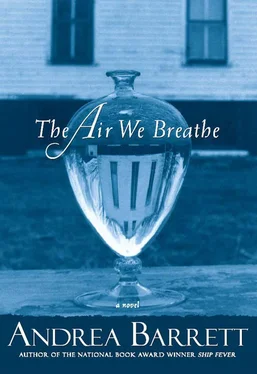In that nurse’s hurry to fill out her forms, she’d dropped Leo’s diagnosis into the conversation as casually as if he already knew it and then walked from one end of the flat to the other, winding between the boarders’ trunks and beds, examining the clothes hung on nails on the walls and the wash on the line in the courtyard. In the kitchen, saying nothing, she counted the plates and the cups. Back at Leo’s side again, she started with the questions: How many people live here, what do they do, where do they sleep? When he explained about Tobias and Rachel and their two children, the four other boarders and the sleeping arrangements, she said, “Children, and you contagious.” From a pamphlet she handed him— Circular #2: Advice for Patients Suffering from Pulmonary Tuberculosis (Consumption) —he numbly read a paragraph:
Be hopeful and cheerful, for your disease can be cured, although it will take some time. In the treatment of your disease, fresh air, good food, and a proper mode of life are more important than medicines. Take no medicine that is not ordered by your physician. Don’t waste time or money on patent medicines or advertised cures for your disease: they are worthless. If you are offered admission to a sanatorium, accept at once. Until then, stay in the open air as much as you can; if possible in the parks, woods, or fields. Never sleep or stay in a hot or close room; keep at least one window open in your bedroom at night. Have a room to yourself, if possible.
As if a person like him would have a bedroom, or a window. As if his part of Williamsburg had a park. The nurse made him spit in a cup, ordered Rachel to keep his clothes and dishes separate, and referred him to a floating day camp for consumptives. There, during the hours he used to spend at work, he lay on a reclining chair on the rear deck of a ferryboat that had once crossed the East River between Brooklyn and lower Manhattan. The breeze blew through the open decks; meals appeared on a long table built in the center, where once there’d been engines and boilers; doctors examined them in rooms along the sides. Men on the lower deck, women on the upper; all of them immigrants, all of them poor. On and off the boat stepped officials from the Board of Health, visiting nurses, social workers, all trying to find placements for the patients. Prying into their backgrounds, investigating their living situations, checking their clothes for lice. After a month he chose not to remember, a woman with lopsided lips had handed him a train ticket and told him to pack his bags.
THE NURSE WHO’D admitted him to Tamarack State was right: he needed more clothes, and he came to miss the heat he’d so hated when he arrived. The leaves turned color, far earlier than he expected; the rain and wind poured through the long windows, kept open day and night; he was constantly cold, he was freezing. Some of us had relatives who arrived on visiting days with extra clothes or treats, but he had no one, and nothing he’d brought was right. He learned to be grateful for the worn but heavy garments grudgingly doled out to the indigent patients — which, he learned, included him. What he couldn’t learn, despite being chided again and again, was to stay still. He spoke to anyone near him, tossed, turned, sneaked out of bed to pick up a magazine he saw on a table at the end of the ward, and then read it, surreptitiously, beneath the covers. The nurses barked at him and Dr. Petrie came to speak to him.
“Why can’t you behave?” our assistant director said. “Don’t you understand how sick you are?”
“I hate this,” Leo said passionately, glaring at the doctor’s small figure. With his crisp dark hair and pointed beard and small oval spectacles, Dr. Petrie resembled the inventor Charles Steinmetz, minus the hunchback. Not quite five feet tall, Leo guessed. No doubt with problems of his own. He yielded his left wrist to Dr. Petrie’s thumb and first two fingers.
“Your lungs,” Dr. Petrie said, his gaze averted while he counted the beats of Leo’s heart, “have little pockets of infection scattered through them, which your body is trying to wall off. Right now the scar tissue around each pocket of germs is fragile, like a spider’s web.” He dropped Leo’s hand. “If you move suddenly, or take a deep breath or stretch your arm — like you just did, when you reached for your pillow: don’t do that —you break the scar tissue and let the germs escape. And then they make new spots of disease, and we have to start all over again. You seem like an intelligent man. Can’t you understand that?”
“Of course I can,” Leo said, “but until now no one’s bothered to explain the point of lying here like a corpse.”
With half a smile, Dr. Petrie said, “We’ll try to keep you better informed.”
By mid-September his temperature was down, his cough had improved, he’d gained six pounds, and the nurses let him walk to the bathroom and sit, for a little longer each day, on a cure chair on the infirmary’s porch. Not since first running away from home had he been so alone, for so long. One day an orderly took him in a wheelchair down the lift, through a tunnel, and into the X-ray facility beneath the dining hall. In the gloom he stood stripped to the waist, bending and turning as the technician instructed, holding his breath and then exhaling, perfectly aware what an X-ray was from his studies in Odessa, but unfamiliar with this particular apparatus. That the technician was a woman struck him as odd, as did the purple glove on her left hand and the angry sores on her right.
His radiographs, Dr. Petrie told him later, showed a small cavity near the top of his left lung.
“Am I going to die?” Leo asked.
“Much of what happens now depends on you,” the doctor answered. Always, they pretend it’s up to us. “Curing is a full-time job. But you’ve made good progress, and there are signs that the cavity is already beginning to shrink. We’re going to transfer you to the men’s annex next week. You’ll be allowed a little more movement, once you’re there. But you’ll still have to be very careful.”
ON A WEDNESDAY morning in October, an orderly took Leo down in the lift from the fourth floor of Central, wheeled him through the corridors and across the covered walkway, and deposited him on a porch off his new room, on the second floor of the men’s annex. Two cure chairs nearly filled the sliver of open space: one of them waiting for him. Company, Leo thought, as eager to meet the figure lying in the other chair as he’d once been to meet a woman. His heart raced as he introduced himself.
“Ephraim Kotov,” the man responded, waiting patiently as Leo arranged himself and struggled with his blankets. Beyond his toes and the wooden railing, Leo saw forest stretching to Canada, ranks of trees marching up hills and down, nearly black where they were shadowed by clouds, and the color of his childhood in between.
“In Minsk I was Kotovachevsky,” his new roommate continued, “but here I am cut-off. Kot-ov.” He held out his hand. “A little joke. Welcome.”
“Thank you,” Leo said, reaching across for Ephraim’s palm.
Ephraim, who like the rest of us had been speculating about Leo during his weeks of isolation, said, “That was Hiram’s chair. Yours now, though; he passed last week. Do you play chess?”
“Not well,” Leo admitted.
“Too bad. Hiram was good at it.”
Leo stretched his legs, wondering what else Hiram had been good at. What he’d liked and disliked, how he’d died. Should he apologize for taking Hiram’s place? He looked back at the forest, seamed here and there with a birch. Below, a train pulled into the siding and tiny figures moved across the platform. For them, he must be a speck in the dog’s right eye. “I came here from New York,” he said. “You too?”
Читать дальше












